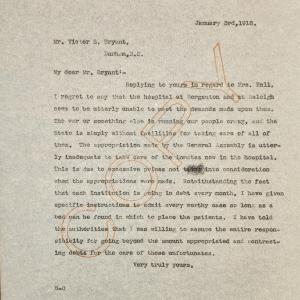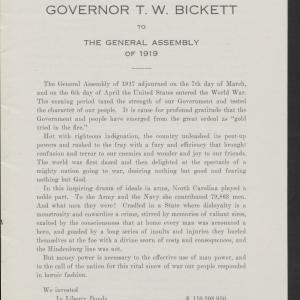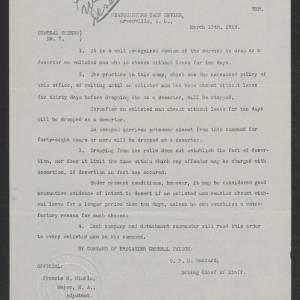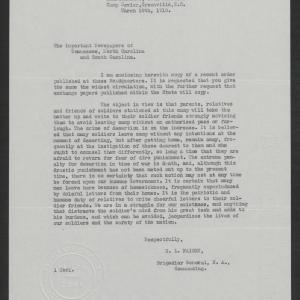- Transcription
WAR DEPARTMENT
OFFICE OF THE PROVOST MARSHAL GENERAL
WASHINGTON
February 23, 1919.
Honorable Thomas W. Bickett,
State Capitol,
Raleigh, North Carolina.
My dear Governor:
I am inexpressably shocked, this morning, to find in the copy of the “Raleigh News & Observer” of February 19, 1919, just come to hand, an account of the dissatisfaction publicly expressed by members of the North Carolina legislature, and other prominent officials, with the passage of my printed report, dealing with resistance to the Draft in that State. Needless to say it is a matter of the deepest concern to myself to discover that the statements in any part of that report are not consonant with the facts as understood by those who know them, that I regret profoundly that anything contained therein has given just ground for the sentiments recorded in the interviews printed in the “Raleigh News & Observer”.
Let me say at the outset that you will do me a great favor if you will take the earliest opportunity to convey to those members of the legislature who have noticed the matter, my expressions of sincere regret that anything was found in the report reflecting unjustly upon the honor of the State in respect of the attitude of any portion of its population towards the Draft. It has been a matter of constant observation in this office that the draft was administered in the State of North Carolina in a manner to reflect the greatest pride upon both the Government and citizens of that State; and at various parts of my printed report, you will find ample data, testifying to North Carolina’s splendid record in the raising of America’s greatest Army. In the administration of this office, it has been my assiduous effort, and I believe with a success virtually universal in every State, to maintain the most harmonious relations between the Federal and the State authorities in the administration of the Selective Draft. And I take this opportunity to place on record my personal appreciation of your whole hearted cooperation with the Federal Government and of the splendid results achieved under your direction by the entire Selective Service administration in the State of North Carolina, and especially for the admirable solution by you of the unusual difficulties connected with draft resistance. In this connection I must especially add my satisfaction at the admirable solution achieved by you in handling the particular situation which arose at the time referred to in the above cited instance.
The explanation of the unfortunate quotation in my report of the newspaper account which has been criticised is as follows:
During the year and a half before the Armistice this Office had received notice both from official correspondence and otherwise of the existence of a few scattered instances of disturbances in five States; viz., Michigan, Montana, North Carolina, Oklahoma and Texas. Not having received any official statement of the scope and meaning of these disturbances and being desirous to present a concise but accurate record of them in my Report to the Secretary of War, I sent out on November 27, 1918, a letter, identical in form to the Military Aides of the Governors in charge of the Draft in these five States. In this letter I stated, that “I want to know with entire accuracy all the incidents of the Draft disturbances that have occurred”, and I requested the Officers to “collect the salient facts and send them to me”, requesting an early reply. Within the next two weeks I received replies from the Military Aides in Montana, Oklahoma and Texas. None however was received from North Carolina. I have no doubt that in some unfortunate manner not understood by men, my letter miscarried. However my annual report was due, and I was therefore obliged to prepare a short account from such unofficial information as was available. In my Office had been collected a large number of newspaper clippings, all of which agreed substantially in their account of the incidents. With the desire of using the account that would substantially portray the facts and retain at the same time the human interest features, the one selected was the one that appears in the Report. This clipping had long been on file in this office, and there was nothing in the remainder of our files to throw doubt upon its correctness. It was considerably cut down from its original form, and as was supposed there was eliminated any journalistic expressions which might be interpreted as unfair or exaggerated. A comparison of the text as printed in my Report with the original account by the journalist will exhibit this. Printed as it was, and not as any part of the text of the Report, but as a quotation from a journalist’s account, it was supposed that its chief value lay in its presentation of the human interest of the incident and in its revelation of the splendid faith in human nature shown by the Local Boards in those districts, and in the manly and unique response to that faith which was evoked from the recalcitrant selectives. The incident does, when judged in its large aspects serve as a lesson to the people of the United States that the heartless and unsympathetic enforcement of the rigid letter of the law was a method not chosen by the Selective Service Officials of North Carolina, and serves as a testimony to the efficacy of tact and humanity in the administration of a drastic law. Your own conduct in applying similar methods in Ashe County has always seemed to me a splendid instance of the way in which the State authorities, by the use of fine tact and judgment demonstrated that it was possible when a community was treated reasonably and humanely, to secure results which would have been impossible under tactless and unsympathetic methods of administration.
It was in fact with the view of illustrating to the people of the United States, the wisdom of employing such methods in the enforcement of that law that the incident in North Carolina was deemed to be of value for general observation and imitation of its lessons. That the specific account printed contained errors of fact is a matter of the deepest regret. But I believe that the general result of the whole incident as a lesson in Government administration, is not thereby impaired. Read in this light, I feel that the incident, in its final results will be interpreted by all readers as adding to the credit of the administration of the Draft in that State and of the character of its people. A comparison with some of the more extensive disturbances which took place in other States will indicate, not perhaps that the same methods would necessarily have succeeded there, but that at any rate North Carolina’s method stands out as a particular success. Judged by the result, the handling of the few recalcitrant selectives in North Carolina is one of the real successes of the Draft and is typical of the frank and American method of meeting difficulties.
With the view to correcting inaccuracies of fact and expression occurring in the account quoted, I am now going to ask you at your earliest convenience to furnish me with an account which will stand as the permanent official record, --- such an account, I mean, as I should have been glad to receive to my letter of November 27, which unfortunately miscarried. I shall see that the account as furnished by yourself or under your direction is substituted in the official report to the Secretary of War, and I shall take all possible measures to give the proper corrective publicity. Trusting that in view of the explanations that have been made, this will render the satisfaction which is justly due, I am
Yours faithfully,
E. H. Crowder,
Provost Marshal General.
JHW-jdl-rth.
P. S. I am enclosing herewith copy of my letter of Nov. 27 1918 and am resending by messenger copies of this letter and my telegram of same date to Senators Overman and Simmons.







